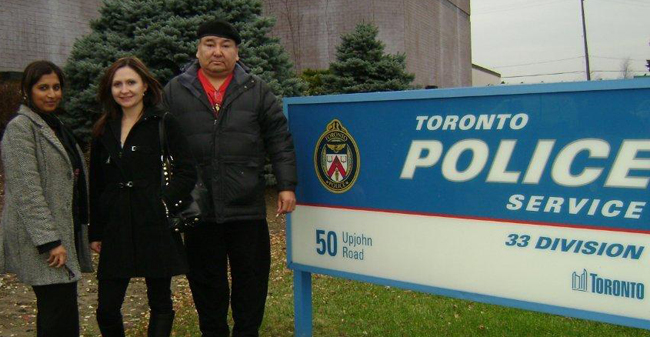Police admit they’re part of problem

By Barb Nahwegahbow
TORONTO – Police have admitted to John Fox that they might be part of the “systemic failing” in finding the truth about his daughter’s death, and have suggested the family request a coroner’s inquest.
At a Nov. 21st meeting at 33 Division Headquarters, Staff Inspector Tony Riviere and four detectives met with Fox to discuss their investigation into the April tragedy when 20-year old Cheyenne Fox fell to her death from a 24th floor condo.
Police told Fox his daughter’s death was a tragic event that likely could have been prevented, and that there was, “…a failing systemically within the system,” and the Toronto Police might be a part of that failing.
“What’s going on with Aboriginal folks,” said Insp. Riviere, “is not just in the city of Toronto. It’s part of a larger problem.”
Riviere said he’d met with the Aboriginal Consultative Committee, a group comprised of Aboriginal community members whose job is to advise the Toronto Police Chief.
“I know there’s some valid concerns about investigations,” said Riviere, “lack of investigations, lack of thorough investigations. I know there’s a lot of valid concerns being expressed on a daily basis with respect to, particularly, Aboriginal communities…” He wanted to use the Committee as a platform to discuss the Cheyenne Fox investigation, and to share with the Police Chief the larger plight of Aboriginal people in Canada.
In the three-hour meeting, police provided Fox details of Cheyenne’s last day and her last hours in the condo. Police will not divulge the condo owner’s name who, according to police, met her for the first time that night. Fox said he was upset that police were treating the condo owner as a victim. The condo owner is viewed by police as a trauma victim because of his alleged failed attempt to save Cheyenne from falling.
According to the condo owner, at one point shortly after she arrived, Cheyenne wanted to leave but he blocked the door. This may have caused Cheyenne to retreat to the balcony, the only other exit. The man told police he did this because he wanted the police to remove her and called 911.
Fox has made repeated unsuccessful requests for the address where his daughter died. Woman’s rights advocate Lesley Belleau, who accompanied Fox to the Nov. 21st meeting, said the family wanted to do a ceremony for Cheyenne at the place where she lost her life.
The police concluded that Cheyenne Fox took her own life, based on the evidence. They said they were aware she was suicidal in the past. Belleau said this was a label often attached to Aboriginal women and women in the sex trade.
Insp. Riviere said a coroner’s inquest addresses issues on a larger level and often drives changes to be made within the larger system, whether it’s the Toronto Police, social services or the federal government. It takes a more comprehensive approach that identifies what measures would prevent similar tragedies.
Questions remain for Fox and his supporters.
Based on evidence gathered by the police, Cheyenne was intoxicated at the time of her death and acting irrationally. Given this fact, was her death an accident and not suicide? Fox said he will discuss the possibility of a coroner’s inquest with his lawyer, Saadia Ali Bokhari who also accompanied him to the Nov. 21st meeting.
It was the rallies against the Toronto Police for their lack of action in his daughter’s death, he said, that finally triggered their investigation. If it wasn’t for the demonstrations, he said, they would have done nothing. Fox is concerned about two other Aboriginal women who have died in Toronto this year under suspicious circumstances.
Cheyenne Fox is one of over 600 missing and murdered Aboriginal women in Canada.


